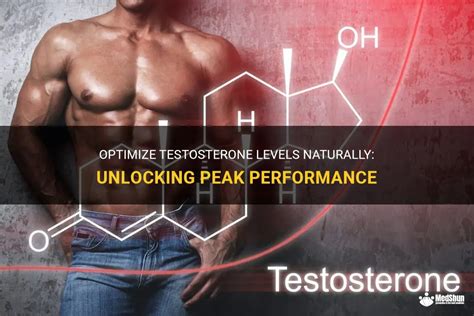How can I naturally boost testosterone for energy & peak male performance?

Understanding Testosterone’s Role
Testosterone is a pivotal hormone for men, playing a crucial role far beyond just sex drive. It influences muscle mass, bone density, fat distribution, red blood cell production, and even mood and energy levels. As men age, testosterone levels naturally decline, which can lead to symptoms like fatigue, decreased libido, reduced muscle mass, and difficulty concentrating. Fortunately, numerous natural approaches can help optimize your body’s testosterone production, fostering greater energy and peak male performance.

Optimize Your Diet for Hormone Health
What you eat significantly impacts your hormone balance. Focusing on a nutrient-dense diet is fundamental for natural testosterone production.
Prioritize Healthy Fats
Cholesterol is a precursor to testosterone, and healthy fats are essential. Incorporate monounsaturated and polyunsaturated fats from sources like avocados, nuts (almonds, walnuts), olive oil, and fatty fish (salmon, mackerel).
Boost Zinc Intake
Zinc is a vital mineral for testosterone synthesis. Excellent sources include oysters, red meat, poultry, beans, nuts, and whole grains.
Ensure Sufficient Vitamin D
Often called the “sunshine vitamin,” Vitamin D functions as a steroid hormone in the body and is directly linked to testosterone levels. Aim for sensible sun exposure, and consume Vitamin D-rich foods like fatty fish and fortified dairy, or consider supplementation under medical guidance.
Include Cruciferous Vegetables
Vegetables like broccoli, cauliflower, and Brussels sprouts contain compounds that help regulate estrogen levels. Maintaining a healthy estrogen-to-testosterone ratio is important for optimal male hormone balance.

Harness the Power of Exercise
Regular physical activity, particularly certain types, is a potent testosterone booster.
Strength Training is Key
Lifting weights, especially compound movements like squats, deadlifts, bench presses, and rows, stimulates significant testosterone release. Focus on progressive overload and aim for 3-4 sessions per week.
Incorporate High-Intensity Interval Training (HIIT)
Short bursts of intense exercise followed by brief recovery periods have been shown to elevate testosterone levels. Examples include sprints or intense cycling.
Avoid Overtraining
While exercise is beneficial, excessive or prolonged intense training without adequate recovery can actually suppress testosterone and elevate cortisol (a stress hormone). Listen to your body and ensure proper rest.

Prioritize Quality Sleep
Sleep is not merely rest; it’s a critical period for hormone regulation and recovery. Chronic sleep deprivation is a major contributor to low testosterone.
Aim for 7-9 Hours
Most adult men require 7-9 hours of quality sleep per night. Testosterone production largely occurs during deep sleep cycles.
Maintain a Consistent Sleep Schedule
Going to bed and waking up at the same time each day, even on weekends, helps regulate your body’s circadian rhythm and optimize hormone release.

Manage Stress Effectively
Chronic stress elevates cortisol levels, which has a direct antagonistic relationship with testosterone. When cortisol is high, testosterone tends to be low.
Practice Stress Reduction Techniques
Incorporate activities like meditation, yoga, deep breathing exercises, spending time in nature, or engaging in hobbies you enjoy to mitigate stress.
Embrace a Healthy Lifestyle
Beyond the core pillars, other lifestyle factors play a significant role.
Limit Alcohol Consumption
Excessive alcohol intake can negatively impact testosterone production and liver function, which is crucial for hormone metabolism.
Maintain a Healthy Body Weight
Excess body fat, particularly around the abdomen, can lead to increased estrogen conversion, thereby lowering free testosterone levels.
Avoid Endocrine Disruptors
Minimize exposure to xenoestrogens found in some plastics (BPA, phthalates), pesticides, and certain personal care products. Opt for natural alternatives where possible.

Conclusion
Naturally boosting testosterone for enhanced energy and peak male performance is an achievable goal through a holistic approach. By consistently implementing strategies related to diet, exercise, sleep, stress management, and overall healthy lifestyle choices, you can significantly improve your hormonal health. Remember that individual responses vary, and it’s always wise to consult with a healthcare professional before making significant lifestyle changes, especially if you suspect a deficiency or have underlying health conditions.









